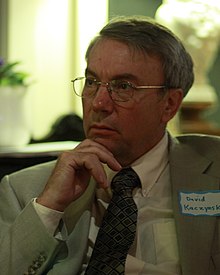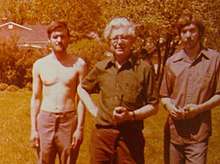David Kaczynski
David Kaczynski (born October 3, 1949) is the younger brother of Ted Kaczynski, the serial bomber dubbed the "Unabomber" by the FBI before his arrest in 1996.[1] His memoir, Every Last Tie: The Story of the Unabomber and His Family,[2] details David's relationship with his brother and parents, and the decision that David and his wife made to share their suspicion that Ted was the Unabomber with law enforcement, which led to Ted's arrest.
David Kaczynski | |
|---|---|
 | |
| Born | October 3, 1949 Chicago, Illinois, U.S. |
| Alma mater | Columbia University |
| Relatives | Ted Kaczynski (brother) |
Early life

Kaczynski is a graduate of Columbia University.[3] Between December 1966 and May 1967 he wrote ten articles for the Columbia Daily Spectator[4] and in March 1967 was promoted to the associate news board.[5] David worked as a schoolteacher in Lisbon, Iowa in the mid-1970s.[6]
Role in Unabomber's arrest
After the anonymous Unabomber demanded in 1995 that his manifesto, Industrial Society and Its Future, be published in a major newspaper as a condition for ceasing his mail-bomb campaign, The New York Times and The Washington Post published the manifesto, hoping somebody would recognize the writing style of the author.[7]
David's wife, Linda Patrik, first suspected Theodore and urged David to read the manifesto when it was published. David recognized Ted's writing style, and the criminal defense lawyer the couple hired notified authorities. On April 3, 1996, police arrested Ted in his rural cabin in Lincoln, Montana. David had received assurance from the FBI that his identity as the informant would be kept secret, but his name was leaked to the media. In addition, he sought a guarantee from federal prosecutors that Ted would receive appropriate psychiatric evaluation and treatment. The Justice Department's subsequent active pursuit of the death penalty for Ted, and Attorney General Janet Reno's initial refusal to accept a plea bargain in exchange for a life sentence, was seen by Kaczynski and other members of his family as a betrayal. Such a plea bargain was eventually reached, and Ted was sentenced to serve life imprisonment with no possibility of parole. Kaczynski has since said that the decision to report his brother was painful but he felt morally compelled to do so.[8]
David Kaczynski received a $1 million reward posted by the FBI for the Unabomber's capture. The reward was funded by a Congressional appropriation for the Department of Justice and was, at the time, one of the largest rewards issued in a domestic case. Kaczynski told the Associated Press that he planned to distribute the majority of the reward money to the bombing victims and their families, adding that this "might help us resolve our grief over what happened."[9]
Career
Prior to turning his brother Ted in to authorities, David Kaczynski worked as an assistant director of the Equinox shelter for runaway and homeless youth in Albany, New York, where he counseled and advocated for troubled, neglected, and abused youth. His brother's confrontation with the death penalty later motivated David Kaczynski to become an anti-death penalty activist. In 2001, Kaczynski was named executive director of New Yorkers Against the Death Penalty (as of 2008, New Yorkers for Alternatives to the Death Penalty). While the mission of NYADP originally focused only on ending the death penalty, under Kaczynski's guidance in 2008, it broadened its mission to address the unmet needs of all those affected by violence, including victims and their families. After leaving the NYADP, Kaczynski served as executive director of Karma Triyana Dharmachakra, a Tibetan Buddhist monastery located in Woodstock, New York.[10]
Personal life
Kaczynski is a practicing Buddhist and a vegetarian.[11] In 2009 he published an essay about his relationship with his brother Ted, from childhood to adulthood, which appeared in a collection of essays.[12]
In popular culture
David Kaczynski was portrayed by Robert Hays in the 1996 television movie Unabomber: The True Story[13] and by Mark Duplass in the 2017 television series Manhunt: Unabomber.[14]
References
- AOL News Archived 2011-01-15 at the Wayback Machine
- "Archived copy". Archived from the original on 2018-06-12. Retrieved 2017-12-18.CS1 maint: archived copy as title (link)
- McFadden, Robert D. (1996-05-26). "PRISONER OF RAGE -- A special report.;From a Child of Promise to the Unabom Suspect". The New York Times. ISSN 0362-4331. Retrieved 2019-10-06.
- "Author Results for David Kaczynski". Columbia Spectator Archive. Retrieved 4 January 2019.
- "Spectator Editors Award Promotions". Columbia Daily Spectator. CXI (87). 20 March 1967. p. 3. Retrieved 4 January 2019.
- "Archived copy". Archived from the original on 2019-03-08. Retrieved 2019-03-07.CS1 maint: archived copy as title (link)
- McFadden, Robert D. (September 19, 1995). "Times and The Washington Post Grant Mail Bomber's Demand" Archived 2018-07-29 at the Wayback Machine. The New York Times.
- Interview on WXXI (AM), Rochester, NY, March 13, 2002.
- Seligmann, Jean; Endt, Friso; Sigesmund, B. J. (August 31, 1998). "A million reasons to grieve". Newsweek. Vol. 132 no. 9. p. 61. eISSN 0028-9604. – via EBSCO's Academic Search Complete (subscription required)
- "About the author" bio for 2016 book
- Matthew Purdy (August 5, 2001). "Our Towns; Crime, Punishment and the Brothers K." The New York Times. Archived from the original on April 20, 2012. Retrieved 2009-03-30.
- Andrew Blauner, ed. (2009-04-20). Brothers: 26 Stories of Love & Rivalry. Jossey-Bass. ISBN 978-0-470-39129-7.
- Kaltenbach, Chris (11 September 1996). "USA rips from headlines with 'Unabomber' movie". The Baltimore Sun. Archived from the original on 6 April 2017. Retrieved 5 April 2017.
- Manhunt: Unabomber (TV Series 2017– ), archived from the original on 2017-09-07, retrieved 2017-09-09